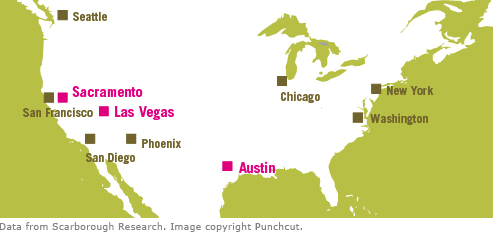US smartphone users spend about 2x more time browsing web sites on their devices than smartphone users in the UK according to M:Metrics‘ newest study.
Also of interest is the sites those users are visiting.
Top US sites are Craigslist and Ebay followed by social media sites MySpace, Facebook and Disney’s Go.com. UK sites were Facebook, Three.co.uk, Sky.com and Microsoft’s Live.com.
The chief insight about the discrepancy between the US and UK usage is the availability of unlimited data plans in the US. Now that’s a user-centered idea.
Add this to digg, del.icio.us, etc.
Check out Information Design Patterns, a site developed by Christian Behrens as part of his Master thesis, The Form of Facts and Figures. This is absolutely the last word in “the development of a design pattern taxonomy for the field of data visualization and information design.”
This type of visual presentation of information starts to get really interesting when you extend them with interactivity and connect them with data.
PICTURED LEFT TO RIGHT: Scatterplot, Simple Pie Chart, Multiset Bar Chart, Stacked Bar Chart, Stacked Area Chart, Tree Diagram, Relation Circle, Isometric Bar Chart, Sankey Diagram
Add this to digg, del.icio.us, etc.

If you were asked to list the top US “early adopter” cities you might start in Silicon Valley. Nope. Austin tops the list, then Las Vegas and Sacramento followed by San Diego, Washington DC, Seattle, Phoenix, Chicago, New York and San Francisco.
The Scarborough report is a free 70 page report that aims to hone in on the “digital savvy” of the US population. The report has narrowed these people down to a small 6% of Americans who have adopted certain digital behaviors — they have DVRs, MP3 players, HDTV; they are likely to use VOD, VOIP and more advanced mobile device features. The report busts assumptions that early adopters are all MySpace users (they’re more likely to read ESPN.com and CNN.com). Download the report for the full demographic analysis.
Add this to digg, del.icio.us, etc.
HTC has released a promotional video of the new HTC Touch Diamond user interface. The device boasts touch input and an accelerometer with HTC’s TouchFlo 3D rendering. The Windows Mobile 6 device will hit shelves any week now in the UK. The product is slated for the US later this year.
Add this to digg, del.icio.us, etc.
At last years’ JavaOne conference Sun Microsystems announced its entry into the presentation layer technology race. JavaFX Mobile will compete with Qualcomm’s uiOne, Adobe’s Flash Lite and Microsoft’s SilverLight.
From the AndroidGuys blog “…Earlier this week, Sun announced details for the forthcoming JavaFX Mobile and even demonstrated it with an Android prototype. Targeting multimedia phones, it will be part of a few planned JavaFX stacks due from the company. Typically, most phones running Java rely on the language for user-installed applications. For JavaFX Mobile however, it will have Java running behind everything from the user interface (UI) toolkit to the telephony, media, and browser software. Ideally, you’ll have the same experience with desktops, mobile devices, set-top boxes, and even automobile dashboards.”
Add this to digg, del.icio.us, etc.
Hulu (http://www.hulu.com), the web tv brand launched a month ago by NBC Universal is set to let users pick which ad to watch.
Maybe you’ve had the experience, trying to catch up to an episode of Lost that your Tivo somehow missed… You go online and are required to watch a few ads — in some cases the same ad repeated throughout the episode. This is the web. Shouldn’t it be smarter than this?
Giving the users a choice of which ad to watch is obvious. Below is a sketch of a concept we’ve put in front of some of our mobile and handheld device clients who are trying to align the gap between users and ad-subsidized content. I’ve contrasted that with what Wired describes as Hulu’s approach.

Continue Reading »
Add this to digg, del.icio.us, etc.


